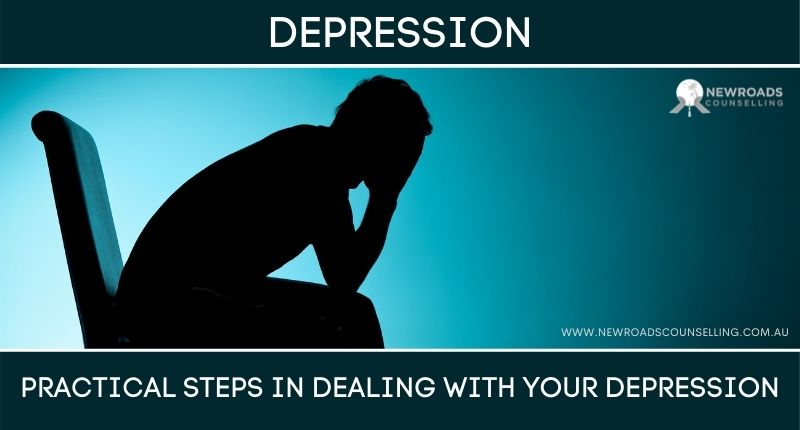Most of us have felt depressed at some point in our life. Feeling depressed can be caused by situations, such as grieving lost loved ones, losing a job, a relationship or marriage, etc., where life returns to normal after a period of time. However, for some this depressed feeling is a regular, ongoing and debilitating issue, that may relate to a chemical imbalance, hereditary causes, long term health issues, abuse, trauma, or substance of abuse. Therefore, this kind of depression cannot be ignored and needs attention. There are some practical steps in dealing with your depression, personally and professionally.
WHAT ARE SOME OF THE SYMPTOMS OF DEPRESSION
The symptoms of depression can vary from person to person. However, the common symptoms are (but are not limited to):
1. Physical
- Lethargy
- Inability to sleep
- Struggling to wake up and wanting to stay in bed all the time
- Loss of appetite or overeating
- Inability to cope with the daily routine
- Inability to concentrate or stay focused
- Sickly
2. Feelings
- Constantly feeling blue or down
- Feeling heavy and sighing
- Sadness
- Feeling miserable
- Consistently unhappy
- Overwhelmed easily
- Helplessness
- Hopelessness
- Easily irritable
- Frustration
- Anger
3. Social
- Avoidance
- Isolation
- Losing interest in life
- Making a lot of excuses
4. Beliefs
- I am non-existing
- I am nothing
- No one cares for me
- There is no point in living
- I am not loveable
- Half glass empty view
WHAT IS THE IMPACT IF YOU DON’T DO ANYTHING WITH YOUR DEPRESSION?
If prolonged depression is unattended, you will:
- Have a miserable life and will slowly develop an opposing view, being unable to see anything positive in life
- It can impact your relationship/marriage and your parenting
- Gradually have a distorted belief system on yourself and the world
- Lose friends and other relationships, as you push others away
- Be unable to allow yourself to be comforted, cared or loved because you close yourself from receiving anything and are unable to respond
- Be trapped into self-pity and blaming others or situations easily
- Be caught up in a vicious cycle – if you see things as depressing, then everything is depressing for you, and that will add to your depression
- Spiral down in your confidence/self-esteem
WHAT CAN YOU DO WHEN YOU ARE DEPRESSED?
There are some practical steps that you can take:
1. Seek professional help
Talk to a professional person (psychotherapist/counsellor/psychologist) regarding your problem. Sometimes people are reluctant to seek professional help because of fear of the stigma depression brings. Seeking professional help is a brave thing to do and there is no shame in doing so. Talking to them will help you to sort your issues out, have a different perspective, learn new skills and be supported by them.
2. Medical help
Go to your GP to have your depression level assessed thoroughly and adequately.
In some cases, you need to have medication to work through your issues with a professional person, particularly if you have a chemical imbalance, hereditary causes, long term health issues or substance of abuse. The medication will help your mood and help you cope better in your daily life, giving you the capacity to work on your issues. Sometimes your GP needs to refer you to a psychiatrist to be diagnosed and medicated thoroughly.
It would be best to communicate with your GP/Psychiatrist any side effects you experience because there are many medications to try and they can choose the best fit for your condition.
3. Some small practical steps
- Have a routine each day, e.g. what time to get up, go outside in the sun for 15minutes, have breakfast, take a shower and get changed even though you don’t go anywhere – but that will help you feel good about yourself
- Have a timetable for each day to help you achieve small goals and to have a purpose in life each day
- Eat healthily and avoid alcohol, sugar and junk food
- Tell yourself that these depressed feelings will pass
4. Support network
As much as it can be challenging to go out and meet people, try to be open to others help and invitations, e.g. family gatherings, having coffee with a friend even though for a short time. Having a support network will help you not feel alone to combat your depression.
Remember, how you feel will impact how you see the world.
Now it is up to you whether you want to take the first step to get well and if you are willing to make some changes, because no one can do it for you, except yourself!
If you are feeling depressed right now but don’t have the courage to seek some help or if you are uncertain whether you need to seek professional help, or if you know someone who is depressed and you don’t know what to do, use the comment section below or email us to express your concern and we are happy to help and guide you.

